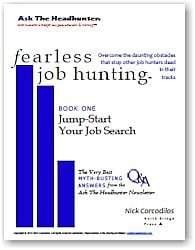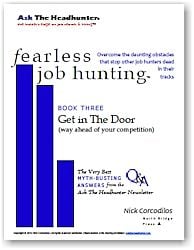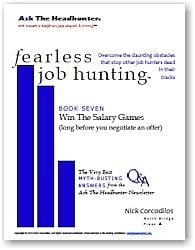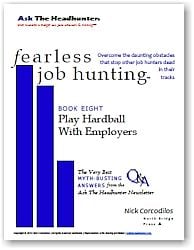In the November 25, 2014 Ask The Headhunter Newsletter, there’s no Q&A. Instead…
 I used to take a break during Thanksgiving week and skipped publishing an edition of the newsletter so that I could cook, bake, and fill the larder with goodies for the holiday. But last year I started a new tradition and cooked up something different for you with the Thanksgiving week edition. Rather than normal Q&A, I’d like to share four tips from the latest Ask The Headhunter publications. If you find something useful in them, I’ll be glad.
I used to take a break during Thanksgiving week and skipped publishing an edition of the newsletter so that I could cook, bake, and fill the larder with goodies for the holiday. But last year I started a new tradition and cooked up something different for you with the Thanksgiving week edition. Rather than normal Q&A, I’d like to share four tips from the latest Ask The Headhunter publications. If you find something useful in them, I’ll be glad.
The idea behind the new Fearless Job Hunting books is that finding a job is not about prescribed steps. It’s not about following rules. In fact, job hunting is such an over-defined process that there are thousands of books and articles about how to do it — and the methods are all the same.
What all those authors conveniently ignore is that the steps don’t work. If they did, every resume would get you an interview, which would in turn produce a job offer and a job.
But we all know that doesn’t happen. The key to successful job hunting is knowing how to deal with the handful of daunting obstacles that stop other job hunters dead in their tracks. Here are some excerpts from Fearless Job Hunting — and if you decide you’d like to study these methods in more detail, I invite you to take 20% off your purchase price by using discount code=GOBBLE. (This offer is limited until the end of the holiday weekend.)
4 Fearless Job Hunting Tips
You just lost your job and your nerves are frayed. Please — take a moment to put your fears aside. Think about the implications of the choices you make. Consider the obstacles you encounter in your job search.
 1. Don’t settle
1. Don’t settle
From Fearless Job Hunting Book 1: Jump-Start Your Job Search, p. 4, The myth of the last-minute job search:
When you’re worried about paying the rent, it seems that almost any job will do. Taking the first offer that comes along could be your biggest mistake. It’s also one of the most common reasons people go job hunting again soon — they settle for a wrong job, rather than select the right one.
Start Early: Research the industry you want to work in. Learn what problems and challenges it faces. Then, identify the best company in that industry. (Why settle for less? Why join a company just because it wants you? Join the one you want.)
Study the company, establish contacts, learn the business, and build expertise. Rather than being just a hunter for any job, learn to be the solution to one company’s problems. That’s what gets you hired, because such dedication and focus makes you stand out.
2. Scope the community
From Fearless Job Hunting Book 3: Get In The Door (way ahead of your competition), p. 6, It’s the people, Stupid:
 You could skip the resume submission step completely, but if it makes you feel good, send it in. Then forget about it.
You could skip the resume submission step completely, but if it makes you feel good, send it in. Then forget about it.
More important is that you start to understand the place where you want to work. This means you must start participating in the community and with people who work in the industry you want to be a part of.
Every community has a structure and rules of navigation. Figure this out by circulating. Go to a party. Go to a professional conference or training program. Attend cultural and social events that require milling around with other people (think museums, concerts, churches). It’s natural to ask people you meet for advice and insight about the best companies in your industry. But don’t limit yourself to people in your own line of work.
The glue that holds industries together includes lawyers, accountants, bankers, real estate brokers, printers, caterers and janitors. Use these contacts to identify members of the community you want to join, and start hanging out with them.
3. Avoid a salary cut
From Fearless Job Hunting Book 7: Win The Salary Games (long before you negotiate an offer), p. 9: How can I avoid a salary cut?
 Negotiating doesn’t have to be done across an adversarial table — and it should not be done over the phone. You can sit down and hash through a deal like partners. Sometimes, candor means getting almost personal. Check the How to Say It box for a suggestion:
Negotiating doesn’t have to be done across an adversarial table — and it should not be done over the phone. You can sit down and hash through a deal like partners. Sometimes, candor means getting almost personal. Check the How to Say It box for a suggestion:
How to Say It
“If I take this job, we’re entering into a sort of marriage. Our finances will be intertwined. So, let’s work out a budget — my salary and your profitability — that we’re both going to be happy with for years down the road. If I can’t show you how I will boost the company’s profitability with my work, then you should not hire me. But I also need to know that I can meet my own budget and my living expenses, so that I can focus entirely on my job.”
It might seem overly candid, but there’s not enough candor in the world of business. A salary negotiation should be an honest discussion about what you and the employer can both afford.
4. Know what you’re getting into
From Fearless Job Hunting Book 8: Play Hardball With Employers, p. 23: Due Diligence: Don’t take a job without it:
 I think the failure to research and understand one another is one of the key reasons why companies lay off employees and why workers quit jobs. They have no idea what they’re getting into until it’s too late. Proper due diligence is extensive and detailed. How far you go with it is up to you.
I think the failure to research and understand one another is one of the key reasons why companies lay off employees and why workers quit jobs. They have no idea what they’re getting into until it’s too late. Proper due diligence is extensive and detailed. How far you go with it is up to you.
Research is a funny thing. When it’s part of our job, and we get paid to do it, we do it thoroughly because we don’t want our judgments to appear unsupported by facts and data. When we need to do research for our own protection, we often skip it or we get sloppy. We “trust our instincts” and make career decisions by the seat of our pants.
When a company uses a headhunter to fill a position, it expects [a high level] of due diligence to be performed on candidates the headhunter delivers. If this seems to be a bit much, consider that the fee the company pays a headhunter for all this due diligence can run upwards of $30,000 for a $100,000 position. Can you afford to do less when you’re judging your next employer?
Remember that next to our friends and families, our employers represent the most important relationships we have. Remember that other people who have important relationships with your prospective employer practice due diligence: bankers, realtors, customers, vendors, venture capitalists and stock analysts. Can you afford to ignore it?
* * *
Thanks to all of you for your contributions to this community throughout the year. Have you ever settled for the wrong job, or failed to scope out a work community before accepting a job? Did you get stuck with a salary cut, or with a surprise when you took a job without doing all the necessary investigations? Let’s talk about it! And have a wonderful Thanksgiving!
If you purchase a book,
take 20% off by using discount code=GOBBLE
(This offer is limited until the end of the holiday weekend.)
: :












